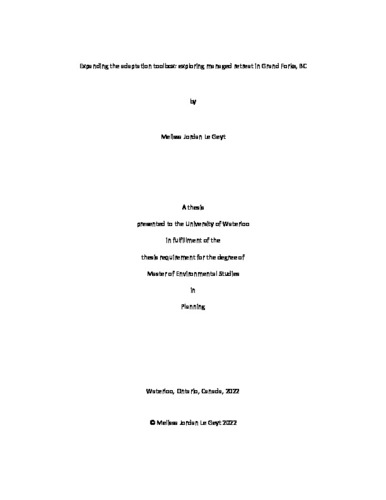| dc.description.abstract | Climate change is likely to continue to increase the frequency and severity of floods in Canada, resulting in increased risk to physical, psychological, social, and economic systems. To effectively reduce flood risk in Canadian communities, managed retreat measures – the removal of people and property from high-risk areas – may need to be employed. Situated within resilience theory, this thesis aimed to increase understanding of property buyout programs as a form of managed retreat in Canada and as an element of future successful flood risk reduction measures. A systematic literature review (n=127) was first used to map the current understanding of property buyout programs as managed retreat in the Canadian context. A case study then critically documented and explored a property buyout program developed following the 2018 flood in Grand Forks, BC. Observational research and semi-structured interviews (n=27) with actors related to the Grand Forks flood recovery efforts and/or managed retreat program were used to identify thematic constraints and enablers of the development and implementation of managed retreat programs, along with elements for successful flood risk reduction measures in similar communities. The systematic review identified interconnected themes relating broadly to finance, social equity, emotional dimensions, timing, and participating agents. The case study research revealed that BC communities wishing to develop a property buyout program face a range of constraints, many of which may only be overcome during the window of opportunity that opens following a large-scale natural hazard event. In such situations, funding may be more accessible to pay for these expensive programs, and community members and politicians more amenable to such measures. Though interviewees broadly supported a managed retreat approach to hazard risk reduction, they stressed the importance of transparent, human-centric implementation that is guided by high-quality data and public input. As climate change increases and highlights hazard risk in communities across BC, public investments at all levels of government are needed to make managed retreat and resilience practices viable tools in the adaptation toolbox. These findings are relevant for communities across Canada, and offer important insights for those interested in undertaking or supporting managed retreat programs. The unique elements of the Grand Forks buyout program make it a valuable case study across many jurisdictions, and the thesis extends academic understandings of resilience theory, managed retreat, climate change adaptation, planning practice, and flood planning. | en |

